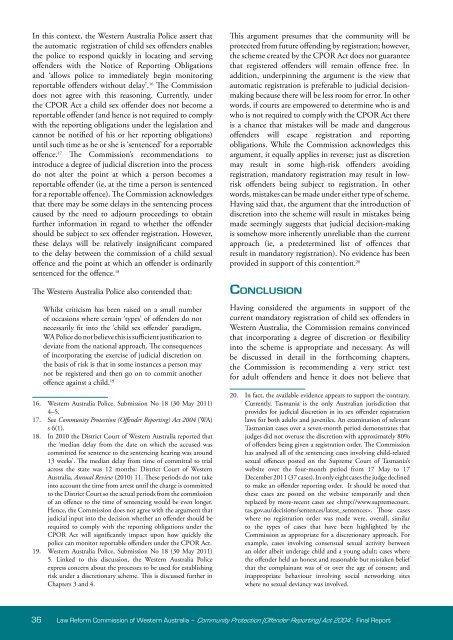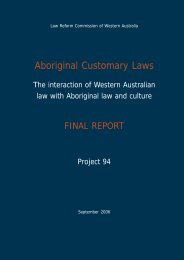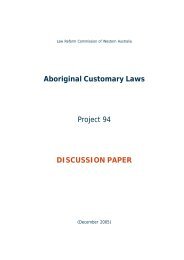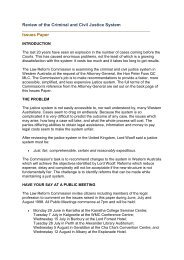Community Protection (Offender Reporting) Act 2004 - Law Reform ...
Community Protection (Offender Reporting) Act 2004 - Law Reform ...
Community Protection (Offender Reporting) Act 2004 - Law Reform ...
You also want an ePaper? Increase the reach of your titles
YUMPU automatically turns print PDFs into web optimized ePapers that Google loves.
In this context, the Western Australia Police assert thatthe automatic registration of child sex offenders enablesthe police to respond quickly in locating and servingoffenders with the Notice of <strong>Reporting</strong> Obligationsand ‘allows police to immediately begin monitoringreportable offenders without delay’. 16 The Commissiondoes not agree with this reasoning. Currently, underthe CPOR <strong>Act</strong> a child sex offender does not become areportable offender (and hence is not required to complywith the reporting obligations under the legislation andcannot be notified of his or her reporting obligations)until such time as he or she is ‘sentenced’ for a reportableoffence. 17 The Commission’s recommendations tointroduce a degree of judicial discretion into the processdo not alter the point at which a person becomes areportable offender (ie, at the time a person is sentencedfor a reportable offence). The Commission acknowledgesthat there may be some delays in the sentencing processcaused by the need to adjourn proceedings to obtainfurther information in regard to whether the offendershould be subject to sex offender registration. However,these delays will be relatively insignificant comparedto the delay between the commission of a child sexualoffence and the point at which an offender is ordinarilysentenced for the offence. 18The Western Australia Police also contended that:Whilst criticism has been raised on a small numberof occasions where certain ‘types’ of offenders do notnecessarily fit into the ‘child sex offender’ paradigm,WA Police do not believe this is sufficient justification todeviate from the national approach. The consequencesof incorporating the exercise of judicial discretion onthe basis of risk is that in some instances a person maynot be registered and then go on to commit anotheroffence against a child. 1916. Western Australia Police, Submission No 18 (30 May 2011)4–5.17. See <strong>Community</strong> <strong>Protection</strong> (<strong>Offender</strong> <strong>Reporting</strong>) <strong>Act</strong> <strong>2004</strong> (WA)s 6(1).18. In 2010 the District Court of Western Australia reported thatthe ‘median delay from the date on which the accused wascommitted for sentence to the sentencing hearing was around13 weeks’. The median delay from time of committal to trialacross the state was 12 months: District Court of WesternAustralia, Annual Review (2010) 11. These periods do not takeinto account the time from arrest until the charge is committedto the District Court so the actual periods from the commissionof an offence to the time of sentencing would be even longer.Hence, the Commission does not agree with the argument thatjudicial input into the decision whether an offender should berequired to comply with the reporting obligations under theCPOR <strong>Act</strong> will significantly impact upon how quickly thepolice can monitor reportable offenders under the CPOR <strong>Act</strong>.19. Western Australia Police, Submission No 18 (30 May 2011)5. Linked to this discussion, the Western Australia Policeexpress concern about the processes to be used for establishingrisk under a discretionary scheme. This is discussed further inChapters 3 and 4.This argument presumes that the community will beprotected from future offending by registration; however,the scheme created by the CPOR <strong>Act</strong> does not guaranteethat registered offenders will remain offence free. Inaddition, underpinning the argument is the view thatautomatic registration is preferable to judicial decisionmakingbecause there will be less room for error. In otherwords, if courts are empowered to determine who is andwho is not required to comply with the CPOR <strong>Act</strong> thereis a chance that mistakes will be made and dangerousoffenders will escape registration and reportingobligations. While the Commission acknowledges thisargument, it equally applies in reverse; just as discretionmay result in some high-risk offenders avoidingregistration, mandatory registration may result in lowriskoffenders being subject to registration. In otherwords, mistakes can be made under either type of scheme.Having said that, the argument that the introduction ofdiscretion into the scheme will result in mistakes beingmade seemingly suggests that judicial decision-makingis somehow more inherently unreliable than the currentapproach (ie, a predetermined list of offences thatresult in mandatory registration). No evidence has beenprovided in support of this contention. 20Co n c l u s i onHaving considered the arguments in support of thecurrent mandatory registration of child sex offenders inWestern Australia, the Commission remains convincedthat incorporating a degree of discretion or flexibilityinto the scheme is appropriate and necessary. As willbe discussed in detail in the forthcoming chapters,the Commission is recommending a very strict testfor adult offenders and hence it does not believe that20. In fact, the available evidence appears to support the contrary.Currently, Tasmania is the only Australian jurisdiction thatprovides for judicial discretion in its sex offender registrationlaws for both adults and juveniles. An examination of relevantTasmanian cases over a seven-month period demonstrates thatjudges did not overuse the discretion with approximately 80%of offenders being given a registration order. The Commissionhas analysed all of the sentencing cases involving child-relatedsexual offences posted on the Supreme Court of Tasmania’swebsite over the four-month period from 17 May to 17December 2011 (37 cases). In only eight cases the judge declinedto make an offender reporting order. It should be noted thatthese cases are posted on the website temporarily and thenreplaced by more-recent cases see . Those caseswhere no registration order was made were, overall, similarto the types of cases that have been highlighted by theCommission as appropriate for a discretionary approach. Forexample, cases involving consensual sexual activity betweenan older albeit underage child and a young adult; cases wherethe offender held an honest and reasonable but mistaken beliefthat the complainant was of or over the age of consent; andinappropriate behaviour involving social networking siteswhere no sexual deviancy was involved.36 <strong>Law</strong> <strong>Reform</strong> Commission of Western Australia – <strong>Community</strong> <strong>Protection</strong> (<strong>Offender</strong> <strong>Reporting</strong>) <strong>Act</strong> <strong>2004</strong> : Final Report








